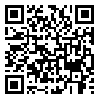BibTeX | RIS | EndNote | Medlars | ProCite | Reference Manager | RefWorks
Send citation to:
URL: http://jcp.khu.ac.ir/article-1-1707-en.html
The present research aims at comparing the effectiveness of Cognitive Behavioral Therapy (CBT) and Behavioral Activation Therapy (BAT) in the improvement of cognitive functions (working memory and simple reaction time) in the heroin abusers in Afghanistan.
To this end, through a semi-experimental design including two groups with pre test and post test, 30 heroine abusers referring to the abstinence center of Universal Kabul Physicians were selected by the availability sampling and were then divided into the two groups of experimental 1 (CBT) and expeerimental2 (BAT). Both groups were first administered the Working Memory Inventory, one of the subscales of Wexler Memory Test (the third edition) and the Stroop software to be evaluated on the working memory and the reaction time. Then the experimental group1 was administered cognitive behavioral therapy and the experimental group2 was administered behavioral activation therapy within 10 sessions of group therapy.
The analysis of the findings indicates that there is a significant difference between the two groups in terms of working memory and simple reaction time. The findings indicate that behavioral –cognitive therapy is more effective in the improvement of working memory and the behavioral activation therapy is more effective in the decrease of the reaction time of heroine abusers. Therefore, both therapy methods are applicable in the improvement of cognitive functions for heroine abusers.
Accepted: 2016/06/12 | Published: 2016/06/12
| Rights and permissions | |
 |
This work is licensed under a Creative Commons Attribution-NonCommercial 4.0 International License. |






